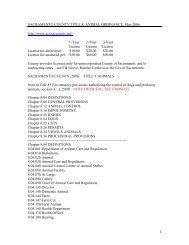Page 1 of 330 The Monthly National Legislation Report 7/5/2010 ...
Page 1 of 330 The Monthly National Legislation Report 7/5/2010 ...
Page 1 of 330 The Monthly National Legislation Report 7/5/2010 ...
You also want an ePaper? Increase the reach of your titles
YUMPU automatically turns print PDFs into web optimized ePapers that Google loves.
<strong>The</strong> <strong>Monthly</strong> <strong>National</strong> <strong>Legislation</strong> <strong>Report</strong>http://mnlreport.typepad.com/<strong>Page</strong> 122 <strong>of</strong> <strong>330</strong>7/5/<strong>2010</strong>voted down last year. <strong>The</strong> most recent incarnation <strong>of</strong> the bill, defeated Sept. 8 on the Assembly floor by a vote <strong>of</strong> 42 to 28, required mandatory spaying and neutering by 6 months <strong>of</strong> age for most dogs and cats.Unsterilized animals would have been permitted by special permit. However, if those animals were found roaming outdoors they would have been impounded at owners' expense. <strong>The</strong> earlier version <strong>of</strong> the billincluded a forced sterilization if the animal was found roaming three times. Both bills carried hefty fines for violations. No further action on the issue has been scheduled.SanFrancisco - (9/8/09) - Officials in San Francisco are considering whether to ban declawing cats on the grounds that the procedure is cruel. But the idea has run into opposition from a surprising source: theSan Francisco Society for the Prevention <strong>of</strong> Cruelty to Animals. <strong>The</strong> San Francisco Chronicle reports that while the group opposes declawing, it worries that a ban would result in more cats being abandoned orput to death.San Jose – (9/30/09)- Beverly Head was <strong>of</strong>ten troubled during her daily walks when she saw bicyclists riding alongside their dogs, pulling their pets on leashes. It was the dogs she was worried about, notwalkers like herself. Tragically, the 62-year-old woman died last month, a day after becoming entangled in a leash as a mountain biker riding alongside his two Siberian Huskies passed her on the Los AlamitosCreek Trail. San Jose police investigated and say in this case, there wasn't a crime. San Jose's municipal code says dog owners must have "direct physical control" <strong>of</strong> their dogs on leashes up to 20 feet long in apark. <strong>The</strong>re is nothing stated about whether dog owners may ride a bicycle. In light <strong>of</strong> the tragedy, Head has been calling people in power to see what could be done to prevent a similar death. His wife hadmentioned her concern two days before the accident about a bicyclist riding alongside a dog. "She thought it was cruel to the dogs," he said. "She saw this little dog stumbling and trying to keep up." KathySutherland, Councilwoman Nancy Pyle's chief <strong>of</strong> staff, said the <strong>of</strong>fice began Monday investigating whether the current municipal code should be amended. "We're taking this seriously," Sutherland said. "Wethink it's worth revisiting the issue."San Mateo – (9/25/09) - Dog owners got their say last night as to when and why canines should be allowed to roam free in city parks in a community meeting conducted by San Mateo’s Department <strong>of</strong> Parksand Recreation. Currently, city ordinance allows for dogs to roam <strong>of</strong>f-leash at only Seal Point Park, but dog owners routinely let their dogs roam free at various parks in the city, including the Central Parkballfield.That practice has raised concerns about safety, health issues, inconsistent enforcement <strong>of</strong> the city’s leash law and the lack <strong>of</strong> open space for dogs to roam free.About 200 people packed the Oak Roomin the city’s Main Library in a meeting moderated by the Peninsula Conflict Resolution Center.Santa Monica – (9/27/09) - <strong>The</strong> Santa Monica City Council voted last week to draft an ordinance torestrict animal declawing in the city. Los Angeles is considering a similar proposal, as is San Francisco.<strong>The</strong> motion, introduced by council members Kevin McKeown and Gleam Davis, directs the city to prepare the ordinance so that it could take effect no later than Dec. 31 because <strong>of</strong> a deadline imposed by apending state law. McKeown called cat declawing "an unacceptable act <strong>of</strong> animal cruelty."In Los Angeles, City Councilmen Paul Koretz and Bill Rosendahl this month presented a motion to ban onychectomy (declawing) or flexor tendonectomy on animals except to address an animal's medicalcondition."We're going to go forward with making a major effort to see that this declawing business doesn't happen in the city <strong>of</strong> Los Angeles," Rosendahl said. <strong>The</strong> issue has gained urgency because <strong>of</strong> a law signed July2 by Gov. Arnold Schwarzenegger that gives the state authority over medical scope-<strong>of</strong>-practice issues and prevents cities and counties from passing ordinances banning medical procedures starting Jan. 1.<strong>The</strong> Society for the Prevention <strong>of</strong> Cruelty to Animals <strong>of</strong> Los Angeles is not in favor <strong>of</strong> animal declawing but is neutral on the issue <strong>of</strong> city bans.CONNECTICUTSB650 – (9/30/09) - Pet owners in Connecticut can now have peace <strong>of</strong> mind knowing their animals will be properly cared for if owners die before their pets as a result <strong>of</strong> a new law that takes effect on 10/1/09,Governor M. Jodi Rell announced today. Under the new law signed June 29, 2009 by Governor Rell, pet owners can set up enforceable trusts to care for their animals, ensuring the animals are not neglected oreuthanized if they can no longer take care <strong>of</strong> the pets. Senate Bill 650, An Act Concerning the Creation <strong>of</strong> a Trust for the Care <strong>of</strong> An Animal is one <strong>of</strong> several new state laws that take effect on October 1, 2009.<strong>The</strong> pet law requires that the owner designate a “trust protector,” someone whose sole duty is to act on behalf <strong>of</strong> the animal, ensuring the pet receives the proper care. A Superior Court or probate court wouldhave jurisdiction over the trust, which terminates when the last surviving animal dies. <strong>The</strong> trust protector can seek legal action in either court to remove or replace a trustee, the individual overseeing the fund, ifthe money was spent on anything other than its intended use. Prior to the new law, pet owners could set up trusts for their animals but those arrangements were considered honorary since animal beneficiariescannot enforce them.FLORIDAGainesville – (9/25/09) - Beginning Oct. 1, Alachua County Animal Services is increasing the licensing fees for all cats and dogs that are not spayed or neutered to $35. "A lot <strong>of</strong> people think I'm penalizingpeople with fertile animals - and I am," said David Flagler, director <strong>of</strong> ACAS. Households that own fertile pets are placing a greater burden on county resources than are those with sterilepets, he said.Howey in the Hills – (9/7/09) - A move is under way to strengthen laws that govern buying, selling and possession <strong>of</strong> exotic animals and it will begin with an attempt to limit sales over theInternet, state legislators and wildlife <strong>of</strong>ficials said. State Sen. Lee Constantine, R-Altamonte Springs, said there is a good law in place, requiring permits and registration, but studies showonly 10 percent <strong>of</strong> exotic animal owners obey it."Changes will include enhancing penalties for repeat <strong>of</strong>fenses, <strong>of</strong>ficials said. A first-time <strong>of</strong>fense is a misdemeanor with a relatively small fine, but repeat <strong>of</strong>fenders could face prison time and see the fine growto as much as $10,000. Ken Wright, a commissioner with the Florida Fish and Wildlife Conservation Commission, said the goal is compliance so that owners <strong>of</strong> the animals don't release them into the wild.<strong>The</strong> licensing fee will remain at $100, so as not to become a burden for owners, he said. An amnesty day will be held around the state Oct. 3. Any exotic animal can be surrendered, no questions asked,commission spokeswoman Joy Hill said. Officials have identified six species <strong>of</strong> interest, strictly because <strong>of</strong> the size to which they grow. <strong>The</strong>y are Burmese, African rock, scrub and reticulated pythons, thegreen anaconda and the Nile monitor lizard. Hunters this fall will be encouraged to kill any <strong>of</strong> these reptiles they encounter, Wright said. But any citizen can kill them without fear or repercussion, he said.Polk County – (9/2/09) - <strong>The</strong> Polk Sheriff's Office is in a bit <strong>of</strong> a dog fight with dog breeders, and show-dog owners over a tough new proposal that would crack down on stray animals. "It targets irresponsibleowners," said Captain Larry Williams, who heads Polk Animal Services. <strong>The</strong> new ordinance would double, or even triple fines. But the most drastic aspect has to do with repeat <strong>of</strong>fenders. If Polk AnimalControl picks up your dog or cat twice within three years, you would be forced to have it neutered and pay a $350 fine. <strong>The</strong> sheriff's <strong>of</strong>fice thought the proposal would be a fairly easy sell to countycommissioners on Wednesday. It wasn't. A number <strong>of</strong> dog breeders and show dogs owners spoke out against it. "I don't need my showdog to be neutered," one woman told commissioners. Sheriffs <strong>of</strong>ficials sayit wouldn't be. <strong>The</strong> plan has an exemption that would cover show dogs. You wouldn't be forced to have your animal neutered as long as you get a note from your vet saying it would not be in the best interest <strong>of</strong>the animals to have it altered. Critics say the proposal came out <strong>of</strong> the blue, and they want a say in the process. It seems like they may now get it. Commissioners tabled the idea. That means sheriff's <strong>of</strong>ficialswill come back and re-pitch it at a later date, but most likely, not until after they meet with the people who showed up to oppose it.GEORGIAFulton County – (9/1/09) - Dog Tethering Prohibited in Fulton County Beginning September 4.Dog owners must find alternative means <strong>of</strong> confining pets. Residents who chain or tether dogs to fixed objectswhile they are unattended must find an alternative means <strong>of</strong> restraining their pets beginning September 4, 2009. In March, the Board <strong>of</strong> Commissioners voted unanimously to ban the practice <strong>of</strong> chaining ortethering dogs. District 2, At-Large Commissioner Robb Pitts sponsored the resolution. Under the amended ordinance, dogs cannot be tethered to a fixed object unless held by an attendant or by the owner.Options for properly restraining dogs include dog runs, mesh fencing and chain link fences. Chain link fences are stronger and more durable; however, residents <strong>of</strong> cities and unincorporated areas within Fultonare urged to check with their local governments for any required fencing permits and homeowners associations to determine the appropriate types <strong>of</strong> fencing before purchasing fencing or fence constructionsupplies. For additional suggestions or supplies, owners should visit their local hardware or home improvement stores. For more information on the dog-tethering ban in Fulton County, contact the Department<strong>of</strong> Environment and Community Development’s Code Enforcement Division at 404-612-2723.Newnan – (9/6/09) - Coweta County is considering an ordinance that bans the continuous chaining <strong>of</strong> dogs -- and now Newnan might be following suit. <strong>The</strong> Newnan City Council will discuss dog tethering attheir meeting Tuesday at 2:30 p.m. at city hall. Mayor and council will consider a study conducted by the Newnan Police Department and decide if tethering is an inhumane practice, according to PublicInformation Officer Gina Snider. According to Snider, the NPD is recommending that the city adopt an ordinance to guide containment <strong>of</strong> animals in a humane way that wouldn't be cost-prohibitive to citizens.<strong>The</strong> ordinance would provide for tethering alternatives, such as the use <strong>of</strong> electronic fencing or "runners." A runner typically consists <strong>of</strong> a long line or cable stretched between two posts, trees, etc. A short line,connected by a pulley to the long line, is attached to the dog's collar, allowing the dog to run freely along the length <strong>of</strong> the long line. <strong>The</strong> police department's study suggests that prolonged tethering can makeanimals more aggressive toward humans and other animals.Oconee County – (9/21/09) - A new Oconee County animal control ordinance recognizes that some people want to let their cats roam free. But the law sets some standards for how much care owners mustprovide outdoor cats and gives <strong>of</strong>ficers a way to know that a pet cat - even if it's a bit independent - isn't feral. Owners who wish to let their cats roam free must get them spayed or neutered, vaccinated againstrabies and have one <strong>of</strong> their ears clipped for identification, according to the new law. Those cats will then get the same 72-hour waiting period as other cats and dogs if they brought to the county animal shelter."<strong>The</strong> way the law will read is that they have to be sterilized, be current on their rabies vaccination and have one <strong>of</strong> their ears clipped," said county Animal Control Director Catlyn Vickers. "If they're markedlike that, we'll know there's an owner." County residents who allow feral or stray cats to stay on their property or feed them for more than three days will be considered their owner, Vickers said. Getting theirnew pets to a local veterinary clinic will be their responsibility. Feral cats that have not been sterilized, vaccinated and identified will be euthanized if they are aggressive or sick, Vickers said. "If we deem (thecat) a public safety issue - if it's charging us when we try to open the cage - we'll euthanize it," she said. "We have too many good cats here to bring in one that's diseased or aggressive." <strong>The</strong> new Oconeeordinance also will address dog issues like tethering. It will prohibit owners from tethering dogs for more than a few hours, Vickers said.Oglethorpe – (9/8/09) - Locals plan to share their ideas on what kind <strong>of</strong> animal control program Oglethorpe County should have when the commission meets tonight in Lexington. While their plans differ, thegoal is the same. County government leaders have heard the requests and started working on a new animal ordinance several months ago, commission Chairman Billy Pittard said.<strong>The</strong> proposed ordinance woulddefine pet ownership and may require owners to put collars with identification on their dogs. “It would expand authority to enforce the laws to our code enforcement <strong>of</strong>ficer,” Pittard said. “What it’s not goingto be is a leash law or a spay or neuter law.” <strong>The</strong> ordinance likely will not be ready for discussion at tonight’s meeting, Pittard said.Warner Robins – (9/22/09) - Warner Robins city council passed an ordinance Monday night setting up a fine and prison time for people who don't sterilize their pets. <strong>The</strong> law will apply to animals adopted




